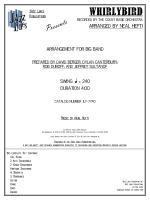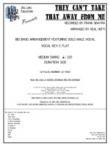WHIRLYBIRD [DOWNLOAD]
Recorded by the Count Basie Orchestra
Arranged by Neal Hefti, Prepared for Publication by David Berger, Dylan Canterbury, Rob DuBoff, and Jeffrey Sultanof

Cat #: JLP-7740-DL
$75.00This product is available for immediate download after purchase.
Questions?
Please call +1-518-587-1102 or email us.
Edition: Jazz Big Band Arrangement
Description: Swing - Difficult
Publisher: Jazz Lines Publications
There are few collaborations in the world of big band jazz that have produced more classic outcomes than those of bandleader Count Basie and arranger Neal Hefti. At the start of their association in 1951, Basie was looking to revive his big band after a period where economics had forced him to downsize his unit to an octet. Hefti, a youthful veteran who had already written for Woody Herman, Buddy Rich, and Charlie Parker, was looking to expand his name in the public eye. When the two brought their highly sympathetic musical personalities together, the result was a completely re-defined sound of the Basie organization, and big band jazz in general, by combining the easy-swinging riff-based style of Basie’s 1930s groups with Hefti’s more contemporary, orchestrated sensibility. Their relationship reached its apex with three albums comprised entirely of Hefti’s arrangements: 1957’s The Atomic Mr. Basie, 1958’s Basie Plays Hefti, and 1962’s On My Way & Shoutin’ Again. These universally-acclaimed classics left the sound of big band jazz permanently altered for the better, revived Basie’s fortunes as a bandleader, and paved the way for Hefti’s transition to the world of scoring for television and film.
Originally titled 'Roller Coaster,' 'Whirlybird' (AKA 'Whirly-Bird') is a textbook example of a big band 'flag-waver' - a raucous, up-tempo romp that will generate almost endless excitement to musicians and listeners alike. Taken at a brisk tempo and building in intensity over the entire course of the performance, it also serves as an excellent feature for your band's star tenor saxophone soloist.
A typical Basie introduction sets up the brisk tempo for the band's opening fanfare, an eight measure statement of the tune's main theme. As quickly as the band announces its presence, it recedes into the background for a chorus of Basie's piano. The rollicking melody kicks off at measure 51 in the saxes, with some timely blats from the trombones to provide a little extra kick. The full band plays the melody in unison at measures 59 and 75, and although things should be fairly forceful, don't allow your band to be too overly exuberant in order to allow them to save up a bit for the finale.
An open tenor sax solo commences at measure 83, handled by the incomparably lively Eddie 'Lockjaw' Davis on the original recording. What follows this solo is a shout chorus that has become known as one of the most thrilling in the entire big band pantheon. Featuring the horns ripping up and down between registers, it is quite a blow for the brass section, but when executed properly creates an unforgettable rush of musical excitement. The shout is followed by some off-rhythm, Louis Armstrong-inspired brass hits that set up an eight measure drum solo. The hits return once again after the drums in order to set up the return of the main melody statement one last time at measure 172. Said melody is briefly tagged, followed up by a quick Basie piano break, and finished off with one final ensemble roar to bring the proceedings to an appropriately energetic conclusion.
This publication was based on the original set of parts from the Count Basie Orchestra - this is not a transcription.








